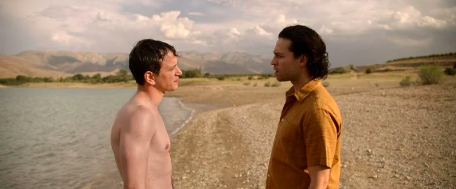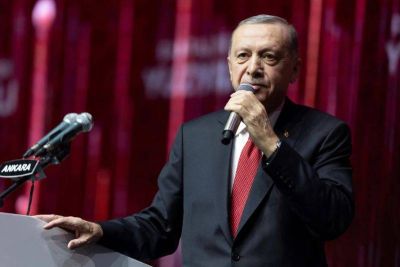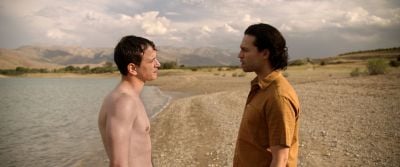
The characters Emre (Selahattin Paşalı, left) and Murat (Ekin Koç) in Kurak Günler (Credit: The Match Factory)
The film opens on an abyss. From the edge, the young Emre contemplates the extent of the corruption that plagues the small Anatolian town where he was newly appointed prosecutor.
Yaniklar is a village hit by a water crisis. The water supply project that had been proposed by the mayor, in the middle of his reelection campaign, crudely reveals its flaws: The ground is collapsing in places, creating a sort of gaping meteorite hole in the landscape. The scenery is beautiful and worrying.
The days are hot. The abyss announces the catastrophe: It is into this wound that all the political and moral ideals of the main character, impeccably played by Selahattin Paşalı, with mysteriously severe and juvenile features, will gradually sink.
The thriller, Kurak Günler (Burning Days), a powerful feature film by Turkish director Emin Alper, received no less than 18 awards at national and international film festivals. However, on the eve of its release in theaters in Turkey, the country’s Ministry of Culture suddenly demanded the reimbursement of the subsidies it allocated for the writing of the script.
At the origin of this implied censorship, there is a wide campaign of denigration fueled by pro-government Turkish media that see in Emin Alper’s film a tool of “LGBT propaganda” and accuses the director of “having lied” about his intentions. At issue is the suggested homoerotic relationship between the prosecutor and the character of Murat (Ekin Koç), a veteran journalist who investigates government corruption in Yaniklar.
“This element was absent from the first drafts of the script I presented to the directorate. I added it afterward,” the director told L’Orient-Le Jour, who nevertheless said that he sent his final script to the General Directorate of Cinema before starting to shoot. He did not encounter any hostility to his project. “Rather than deceiving them, our strategy was to push the limits of what was acceptable to the ministry.”
‘Everybody’s talking about it’
According to Alper, it all started when his film was nominated in the Queer Palm category at the Cannes Film Festival. The title drew the attention of the outlets close to the Turkish regime, whose conservatism is becoming increasingly authoritarian. In power since 2003, Recep Tayyip Erdogan regularly labels the LGBT+ cause as a “deviants and perverts movement” that he considers incompatible with building a “strong family” and, by extension, a “strong nation.”
But pyromaniacs make the best firemen: The day after the announcement of the ministry, Emin Alper put out a call on his social networks encouraging the public to go en masse to theaters to support the film and help repay the public aid. It worked. “Going to see Kurak Günler has almost turned into a protest movement,” said the director. In three days, the movie sold 51,000 tickets in Turkey. “The number of view entries exceeded 200,000 last week. This is very good for an art film, especially in the post-COVID environment. These kinds of films usually do not exceed 100,000,” he said.
“When the state wants to censor a cultural production in any form, it always finds the attention and support of the public in Turkey,” said Cenk Ozbay, professor of sociology and gender studies at Sabanci University near Istanbul. “This is the first time I discuss a film with my students after class, especially a Turkish film. All of a sudden, everyone was talking about it,” he said.
In recent years, the Turkish government has made an authoritarian shift intensified on social issues. This tougher stance was made visible by the withdrawal of Turkey from the Istanbul Convention on combating domestic violence and violence against women in July 2021.
“The LGBTI+ issue is the real red line for the state, which thus reveals its institutional homophobia,” said the director. The Turkish president is multiplying his attacks on the gay community, banning the Pride marches held every year to celebrate diverse sexual identities and encouraging hostile demonstrations against them. “Normally, such films would not be shown in mainstream cinemas in Turkey. The only time we get to see films showing homoeroticism is when film festivals are held and they are usually shown only once,” said Turgay, an activist with Lambdaistanbul, an association working for LGBT+ rights in Turkey.
Indirect pressure
Through the prism of “multiple masculinities,” Cenk Ozbay sees in Kurak Günler the portrait of a two-tiered Turkish society. “On the one hand, we have a young, modern, secular man from an urban background who has landed in a small rural town in Anatolia, and on the other hand, we are confronted with men who represent the local networks of an authoritarian, patriarchal, religious and nationalist power,” he said. “If I were to adopt the mentality of the authorities, I would be more annoyed by the film’s representation of the Turkish political world and society than by the homosexual allusions,” the academic said. It is indeed difficult not to spot in this “story of corruption and authoritarianism,” according to the director, a harsh criticism of the Turkish political scene.
Since the attempted coup of July 2016, attributed to Fethullah Gülen’s movement, the surveillance of the authorities with regard to the opposition figures has been obsessing the regime. That is true especially since the director does not hide his convictions. In October, at the Antalya Golden Orange Film Festival, where the film won nine awards, Emin Alper delivered a notable speech in support of one of the film’s co-producers, Çiğdem Mater, who has been serving an 18-year prison sentence since April for her participation in the Gezi Park protests in 2013.
“Making films is becoming increasingly difficult, especially if they are political,” said the filmmaker, who added that “the authorities exert indirect pressure, implying that funds could eventually be withdrawn if elements of the script are not approved.”
Because fiction has the advantage of being able to overcome a certain reality. At the end of a breathless final hunt by the villagers against the prosecutor, who has become the outlet for all their hatreds, Emre finds himself once again on the brink of the abyss, saved by the same gigantic hole that separates him from his detractors, who have become a shapeless mass in the darkness of the night.
This article was originally published in French in L'Orient-Le Jour. Translation by Joelle El Khoury.

